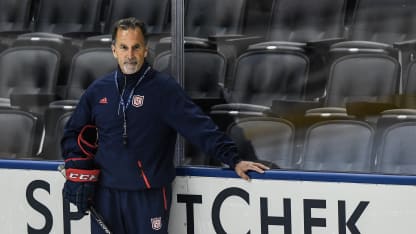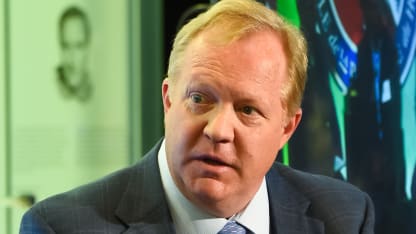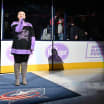LAS VEGAS - Jim Johannson wasn't officially part of the Blue Jackets, but his legacy can be found throughout the organization.
It's in the locker room, where Johannson's role as USA Hockey's general manager connects nine American-born players who've combined to play in 39 international events for the United States.
It's in the coach's office, where head coach John Tortorella worked with Johannson closely, once as a U.S. assistant and twice as head coach - including the 2017 World Cup of Hockey. It's in the executive suite, where assistant general manager Bill Zito developed a strong bond with Johannson over the past 25-plus years, first as a player agent and then as a member of the Jackets' front-office.
His legacy is in their voices, too, and the way they struggle to even speak about Johannson's sudden and shocking death early Sunday, at age 53, while sleeping at his home in Colorado Springs, Colo.
"We all know what he means to USA Hockey," Tortorella said Tuesday, collecting his thoughts. "We all know what he means to so many kids that are playing, and some that are not playing, as far as what he's done for them and their families. But the biggest thing for me is, he's the type of guy that you'd want to emulate in how you act. Gracious, just as humble as you can be … he was just a really good person. We lose another really good person."
Jim Johannson leaves lasting impact on many in Jackets organization
Head coach John Torotorella, assistant GM Bill Zito and more in the Blue Jackets organization react on the legacy of Jim Johannson

© Minas Panagiotakis

© Graig Abel/Getty Images
Surviving Johannson are his wife, Abby, and young daughter, Ellie, which has really stuck with those who knew him well. That includes defenseman Jack Johnson, who first met Johannson when he was 16 and has since represented the U.S. 12 times.
"He was way too young to go," Johnson said, pausing to let his emotions calm. "You think about his wife and his little girl, and I just think about all my international tournaments. I don't even know how many I've been to, but wherever we were in the world, 'J.J.' was there and always had a smile on his face. He kind of had that infectious personality that kind of lifted the room and lifted you when you talked to him. I still can't get my head around the fact that he's no longer with us."
Johannson played college hockey at the University of Wisconsin from 1982-86, and helped the Badgers win a national championship in his freshman year. He was drafted by the Hartford Whalers in the seventh round (No. 130) of the 1982 NHL Draft and played professionally in the International Hockey League between 1987-94.
Johansson also played for the U.S. in two Olympics (1988 and 1992), and in the 1992 IIHF Men's World Championship - where he developed his passion for representing the U.S. internationally.
After five years as general manager of the Twin Cities Vulcans in the United States Hockey League, Johannson's career with USA Hockey began in 2000. His first job was manager of international activities and U.S. Olympic Committee relations, and he quickly worked his way up to senior director of hockey operations in 2003. Four years later, in 2007, he became assistant executive director of hockey operations, which is the position he held the past 10 years.
"He is going to be missed in so many ways," Tortorella said. "Everybody seems to talk about USA Hockey, but there are a lot more important things than USA Hockey, and what he's done for people. We're not going to fill that hole, and I just wish their family the very best."
Johannson's death is still tough for Tortorella to accept and rationalize. He and others in Columbus just saw him in December, about a month ago, when the U.S. held its training camp for the 2018 IIHF World Junior Championships at Nationwide Arena.
The Blue Jackets have plenty of stories and memories of Johannson they can share with each other, but it's too soon for Tortorella. The pain is too raw right now.
"I haven't gotten there," he said. "I still haven't totally wrapped my head around it. We just saw him just a few weeks ago, and he's the type of guy who, when you see him, you light up because you know something good's going to come your way in that conversation. It's a bit of a shock to all of us that know him up close and personal, just how many lives he's touched … being taken away so early. It's hard."
It's also a shared feeling, from Tortorella to Zito to the U.S. players in the Jackets' locker room.
"That struck me," said captain Nick Foligno, who's played for the U.S. in four tournaments. "It just really breaks your heart. I know him, not just as a guy who ran USA Hockey, but as a family man. I remember talking to him when he was having his baby, and how excited he was, so my heart just breaks for that whole family and the people that were close to him, and for USA Hockey."
Johannson, whose memorial service was held Wednesday in Colorado Springs, was instrumental in helping USA Hockey move upward within the realm of international hockey.
During his time there, the U.S. won 64 medals in major competitions, including 34 gold, 19 silver and 11 bronze. He also pushed to create the United States National Team Development Program, which is now based in Plymouth, Mich. - a center that is also now a resource for all U.S. hockey teams, across all platforms.
"He did a lot for everyone who played with USA Hockey, whether you knew it or not," said forward Tyler Motte, who has represented the U.S. four times. "He was always behind the scenes, and did a really great job with every international tournament I was involved in, picking teams, setting up trips, whatever it may have been. Hopefully we're able to give him a tribute here at some point, in some way. It's still tough to believe and deal with."
Jordan Schroeder, who's worn the stars and stripes five times, said the news ripped through the hearts of those who knew Johannson, including the Blue Jackets' Americans. Asked how he'd remember Johannson, Schroeder answered with a smile.
"His laugh," Schroeder said. "He always had a unique laugh, and was always smiling. He was always upbeat and energetic. He just loved to talk to everyone. I think we were all just devastated to hear the news. It's heartbreaking."
Zito, who credits Johannson's open-minded approach for a measure of his own professional success, tells a story that captures perfectly Johansson's looming presence as the heart-and-soul of USA Hockey.
It involves the 2015 IIHF Men's World Championship in the Czech Republic, the U.S. National Sled Hockey team and Johannson's devout interest in both, which were being played concurrently.
"We're at the world championships in Prague, and he's going, 'Yes!' and I'm like, 'What are you 'Yessing!' about?'" said Zito, who was on the U.S. advisory board for that U.S. team. "He says, 'We just scored!' And I go, 'What are you talking about?' He says, 'The sled team just scored against Canada. We're up 3-1!' He was watching it online."
Zito couldn't believe it.
He knew how much time Johannson poured into the selection and management of U.S. teams, but didn't fully realize how invested Johannson was in every aspect of USA Hockey - from the men's teams stocked with NHL talent to the sled teams that compete internationally in Paralympic events.
"You know the other thing about Jimmy, and this is a really, really, really, really, really important thing, about him and his character," Zito said. "It's easy to hang out with NHLers. It's easy to take care of Zach Werenski and Seth Jones. But that guy went to the wall for the Paralympic teams, for the deaf teams and for the women's teams. He did everything for those players and those athletes too."
As it turned out, the U.S. sled team won the 2015 IPC world championship, when Zito and Johannson watched the U.S. men's team win bronze in Prague. It was the sled team's third world title, after shutting out Canada, 3-0, in the gold medal game at Harborcenter in Buffalo.
The U.S. tore through that tournament undefeated for the first time ever, and outscored the opposition 29-1. Halfway across the globe, Johannson was ecstatic.
"That's part of what he was all about," Zito said. "And it made him such a special guy."


















